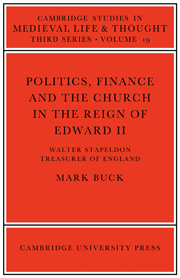Book contents
- Frontmatter
- Contents
- Dedication
- Acknowledgements
- Abbreviations
- 1 INTRODUCTION
- 2 FAMILY AND EARLY LIFE
- 3 THE BISHOPRIC OF EXETER
- 4 ROYAL FREE CHAPELS
- 5 THE FOUNDATION OF STAPELDON HALL
- 6 POLITICS AND DIPLOMACY 1309–13
- 7 THE CONSOLIDATION AND COLLAPSE OF ROYAL POWER 1320–1326
- 8 THE EXCHEQUER
- 9 THE CASE AGAINST STAPELDON
- 10 MURDER
- Appendix of documents
- Bibliography
- Index
5 - THE FOUNDATION OF STAPELDON HALL
Published online by Cambridge University Press: 05 November 2011
- Frontmatter
- Contents
- Dedication
- Acknowledgements
- Abbreviations
- 1 INTRODUCTION
- 2 FAMILY AND EARLY LIFE
- 3 THE BISHOPRIC OF EXETER
- 4 ROYAL FREE CHAPELS
- 5 THE FOUNDATION OF STAPELDON HALL
- 6 POLITICS AND DIPLOMACY 1309–13
- 7 THE CONSOLIDATION AND COLLAPSE OF ROYAL POWER 1320–1326
- 8 THE EXCHEQUER
- 9 THE CASE AGAINST STAPELDON
- 10 MURDER
- Appendix of documents
- Bibliography
- Index
Summary
In the early fourteenth century most Oxford students, able to pay their own way, resided in halls, the great majority of which were not endowed foundations. It was this lack of endowment which distinguished the hall from what came later to be called a college. A college, or endowed foundation, was the poor relation. The distance from its present status and prestige is further magnified when measured against that of a large, richly endowed religious house, whose community resided for life and whose head could exercise considerable local influence. The endowed halls were largely graduate and self-governing communities, whose members relinquished their fellowship as soon as they secured a benefice of the value of about £5. Their founders were men who wished to provide opportunity for those without means and usually stipulated that preference be given to poor scholars. Fellowships were usually tied to the diocese from which their endowment, the revenues of a parish church, was drawn. In Stapeldon's case fellowships were initially restricted to men from the diocese of Exeter and the dean and chapter of Exeter were designated trustees of the endowment.
Beyond the intercessory prayers which their benefactions would earn them, no absolutely uniform aim can be discerned for the founders of colleges. Although tied to individual dioceses, the extent to which these fellowships would have directly enhanced the standard of those at work in the parishes must not be overestimated.
- Type
- Chapter
- Information
- Politics, Finance and the Church in the Reign of Edward II , pp. 99 - 114Publisher: Cambridge University PressPrint publication year: 1983



